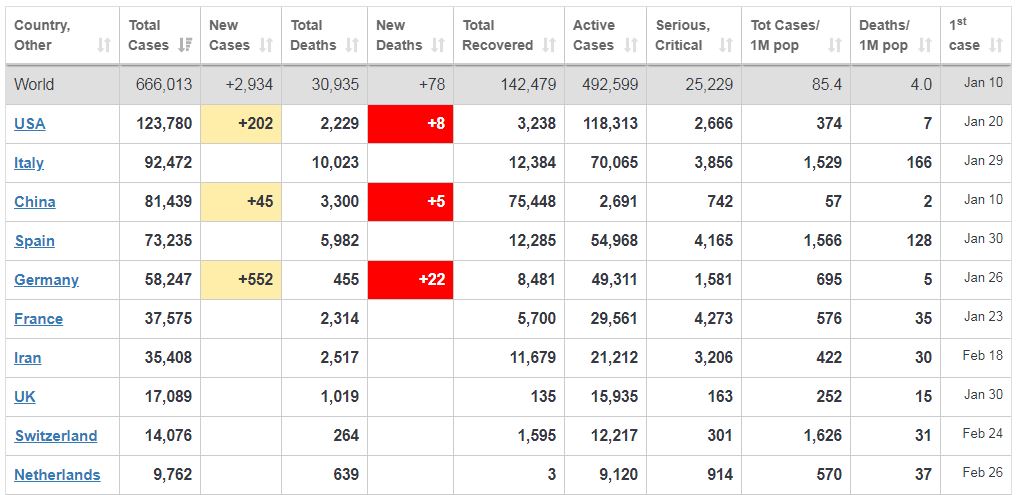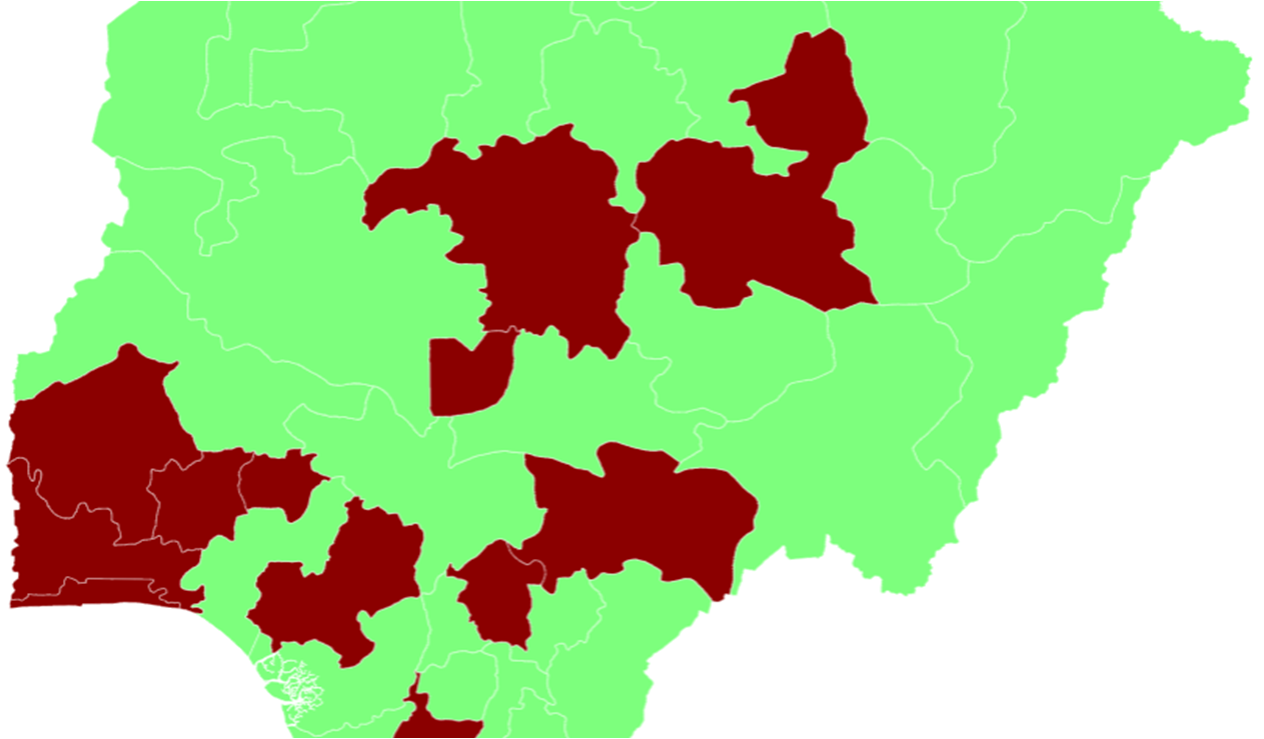After Coronavirus disease (COVID-19) broke out in Nigeria on Thursday 27th February 2020, beginning from Tuesday 17th March, the Nigeria Centre for Disease Control (NCDC) has continued to churn out figures of confirmed cases almost on a daily basis.
The figures being churn out by the NCDC, while on one hand, give hope, have been judged understated due to testing capacity. On the other hand, when the trend of these figures are contrasted with the trend of the figures reported in countries such as the US, Italy, Spain, where the COVID-19 has worse hit, there are indications that Nigeria’s worst days are here.

To understand what will happen with COVID-19 in Nigeria in the next 30 days, let’s first critically examine the timeline, what has happened with COVID-19 in the country in the past 30 days, how Nigeria moved from no case to 97 confirmed COVID-19 cases.
Timeline of COVID-19 in Nigeria in past 30 days
As of February 26th, no case of COVID-19 had been confirmed in Nigeria; however, awareness was on.
There is no case of #COVID19 in Nigeria
The Nigeria Centre for Disease Control is closely monitoring the outbreak globally
We urge the public to disregard rumours & discourage further spread
NCDC will inform the public if a case is reported in Nigeria pic.twitter.com/mkV8jOO2EL
— NCDC (@NCDCgov) February 26, 2020
On February 26th, 11 suspected cases of COVID-19 were tested and all turned negative.
As at 26th Feb 2020, 11 suspect cases of #COVID19 have been tested in Nigeria & all turned negative
We urge the public to disregard & discourage the spread of rumours@NCDCgov continues to monitor the outbreak globally & will inform the public if a case is reported in #Nigeria pic.twitter.com/S0Mp36nDzy
— NCDC (@NCDCgov) February 26, 2020
February 27
On February 27th, the Minister of Health, Dr. Osagie Ehanire announced the very first confirmed COVID-19 case, an Italian man in Lagos State.
The Honourable Minister of Health has announced a confirmed coronavirus disease (COVID-19) case in Lagos State
The case, which was confirmed on the 27th of February 2020, is the first case to be reported in Nigeria since the beginning of the outbreak in China in January 2020 pic.twitter.com/r6uJfeIUhv
— NCDC (@NCDCgov) February 27, 2020
Following the outbreak of the disease in the country, the NCDC activated its National Emergency Operations Centre and began working with Lagos State Ministry of Health to manage the first index case and implement firm control measures.
Nigerians were advised to keep calm, with the Minister of Health saying, the index case patient was “clinically stable, with no serious symptoms, and is being managed at the Infectious Disease Hospital in Yaba, Lagos”. Identifying and reaching out to possible contacts of the case was done.
From February 28th to March 6th, there was quiet. However, on March 6th, 3 COVID-19 cases were suspected. However, all the three COVID-19 suspected cases, travellers from France, England and China, whose samples were collected for analysis, tested negative and they were discharged.
UPDATE ON #COVID19Lagos
Breaking!
All the three #COVID19 suspected cases; travellers from France, England and China whose samples were collected yesterday for analysis have tested negative and they have been dischsrged – @ProfAkinAbayomi@followlasg@jidesanwoolu @NCDCgov pic.twitter.com/xg0yPKSwZG— LSMOH (@LSMOH) March 6, 2020
By March 8th, 23 cases have been suspected in the country. Of the 23 suspected cases of COVID-19, 22 were NEGATIVE and only one was positive as at the 7th of March 2020.
Of the 23 suspected cases of #COVID19 reported so far in Nigeria, 22 were NEGATIVE and only one is positive as at the 7th of March 2020.
The NCDC will continue to produce daily situation reports and keep Nigerians updated#COVID19Nigeria pic.twitter.com/CvvjJIs12t
— NCDC (@NCDCgov) March 8, 2020
March 9
The second confirmed case of COVID-19 in Nigeria was confirmed on March 9.
The Honourable Minister @Fmohnigeria has announced a second confirmed case of #COVID19 in Nigeria.
This second case is a contact of the index case, in Ogun state. The new case has been in isolation and was tested as part of our strategy to test all contacts of the index case. pic.twitter.com/aTkzEy3qXo
— NCDC (@NCDCgov) March 9, 2020
“The index case of COVID-19 in Nigeria was detected by an astute physician who was aware of our national case definition. The second confirmed case of COVID-19 in Nigeria was detected due to the diligence of our work,” Director General of the NCDC, Chikwe Ihekweazu said on a ChannelsTV programme.
March 13
By March 13th, World Health Organization (WHO) had declared COVID-19 as a pandemic
“The @WHO has now declared #COVID19 as a pandemic. This is a call for action for increased resources to quickly detect and control this outbreak. It is not a time for fear and panic. We are investing resources to strengthen Nigeria’s response”
~ HMH, @DrEOEhanire pic.twitter.com/ZnNefXB9gM
— NCDC (@NCDCgov) March 13, 2020
March 15
The NCDC was aware of a patient in Enugu suspected to have COVID-19.
The Nigeria Centre for Disease Control is aware of the patient in Enugu, suspected to have #COVID19.
This is one of several alerts received daily at the National #COVID19 Emergency Operations Centre.
The patient is in isolation, sample collected and results expected tomorrow. pic.twitter.com/Qv3JEJiyKz
— NCDC (@NCDCgov) March 14, 2020
The laboratory result of the patient, however, came out negative.
The laboratory result of the patient in Enugu suspected to have #COVID19 is NEGATIVE
It is important to wait for confirmation from NCDC before spreading information on social media.
NCDC will continue to provide updates to the publichttps://t.co/zQrpNeOfet https://t.co/chldqET4Wz pic.twitter.com/SLS4Dw8Zyk
— NCDC (@NCDCgov) March 15, 2020
March 17
On this day, the Minister of Health announced the 3rd case of COVID-19 in Nigeria. The case was a Nigerian who returned to Lagos from the UK and developed symptoms during her 14-day self-isolation.
The Honourable Minister @Fmohnigeria has announced the 3rd case of #COVID19 in Nigeria
The case is a Nigerian who returned to Lagos from UK & developed symptoms during her 14-day self-isolation
She is clinically stable & is being treated at Infectious Disease Hospital, Lagos pic.twitter.com/eRKAAx3JzK
— NCDC (@NCDCgov) March 17, 2020
March 18
March 18th, the Federal Ministry of Health announced 5 new cases of COVID-19 in Nigeria bringing the total number confirmed cases in the country to 8. All 5 cases had a travel history to the UK and the USA.
@Fmohnigeria has announced 5 new cases of #COVID19 in Nigeria bringing the total number confirmed cases in Nigeria to 8
All 5 cases had a travel history to the UK/USA
We urge Nigerians to remain calm as public health response activities are intensified across the country pic.twitter.com/yoKLHXoxhq
— NCDC (@NCDCgov) March 18, 2020
March 19
March 19th, 4 new cases of COVID-19 were confirmed in Nigeria; a total of 12 confirmed cases in Nigeria.
Today, 4 new cases of #COVID19 were confirmed in Nigeria; a total of 12 confirmed cases in Nigeria
We urge Nigerians to remain calm. Please adhere to recommendations by health authorities including handwashing, self isolation for returning travelers and others pic.twitter.com/WMznwl2UyA
— NCDC (@NCDCgov) March 19, 2020
Today, NCDC joined the press briefing convened by the Honourable Minister @Fmohnigeria, @DrEOEhanire to provide updates on #COVID19Nigeria as well as national response activities.
As at 20 March 2020, 12 cases of #COVID19 has been recorded in #Nigeria. pic.twitter.com/DC31LHWCXF
— NCDC (@NCDCgov) March 20, 2020
March 21
On March 21st, Nigeria recorded the first COVID-19 cases outside Lagos. On this day, the Federal Ministry of Health confirmed 10 new cases of COVID-19. Of the 10 new cases, 3 are in the Federal Capital Territory and 7 are in Lagos. 9 out of the 10 cases had travel history outside Nigeria. The 10th case is a close contact of a confirmed case.
@Fmohnigeria has confirmed 10 new cases of #COVID19 in #Nigeria
Of the 10 new cases, 3 are in the Federal Capital Territory and 7 are in Lagos
9 out of the 10 cases have travel history outside Nigeria in the last one week. The 10th case is a close contact of a confirmed case pic.twitter.com/Bm557clqL0
— NCDC (@NCDCgov) March 21, 2020
March 22
Eight new cases of COVID-19 were confirmed in Nigeria on March 22.
Three new cases of #COVID19 have been confirmed in Lagos, Nigeria
2 cases are returning travellers and 1 is a contact of a confirmed case.
As at 05:28 pm on the 22nd of March, there are 30 confirmed cases of #COVID19 in Nigeria. 2 have been discharged with no deaths. pic.twitter.com/UQVYdkE9Xk
— NCDC (@NCDCgov) March 22, 2020
March 23
On March 23rd, 10 COVID-19 cases were confirmed, with Edo State recording its first case.
Five new cases of #COVID19 have been confirmed in Nigeria: 2 in FCT, 2 in Lagos & 1 in Edo
2 cases are returning travellers from the UK
As at 09:45 am on 23rd March, there are 35 confirmed cases of #COVID19 in Nigeria. 2 have been discharged pic.twitter.com/brTI9PFsYH
— NCDC (@NCDCgov) March 23, 2020
Four new cases of #COVID19 have been confirmed in Nigeria. 3 are in Lagos State and 1 in FCT
Two of these cases are returning travellers
As at 11:00pm on the 23rd of March, there are 40 confirmed cases of #COVID19 in Nigeria. 2 have been discharged with 1 death recorded pic.twitter.com/cR94MO6xnC
— NCDC (@NCDCgov) March 23, 2020
Same March 23rd, Nigeria recorded its first COVID-19 death. The case was a 67-year-old male who returned home following medical treatment in UK. The case was later confirmed to be Suleiman Achimugu. He had underlying medical conditions: multiple myeloma and diabetes, and was undergoing chemotherapy.
The 1st #COVID19 death in Nigeria has been recorded. The case was a 67 year old male who returned home following medical treatment in UK
He had underlying medical conditions- multiple myeloma & diabetes & was undergoing chemotherapy
Our thoughts are with his family pic.twitter.com/A7STOjTQeW
— NCDC (@NCDCgov) March 23, 2020
March 24
Four new cases of COVID-19 were confirmed on this day, with Ogun State recording its first case.
2 new cases of #COVID19 have been confirmed in Nigeria. 1 is in Lagos State & 1 in Ogun
One case is a returning traveler. The second case is contact of a previously confirmed case
As at 1pm on March 24, there are 42 confirmed cases of #COVID19 in Nigeria-2 discharged, 1 death pic.twitter.com/buVcnpdFTQ
— NCDC (@NCDCgov) March 24, 2020
2 new cases of #COVID19 have been confirmed in Nigeria: 1 in FCT and 1 in Bauchi
The cases have travel history to Germany and the UK.
As at 06:25 pm on 24th March, there are 44 confirmed cases of #COVID19 in Nigeria. 2 have been discharged with 1 death pic.twitter.com/JbCVwSrxFd
— NCDC (@NCDCgov) March 24, 2020
March 25
Seven new cases of COVID-19 were confirmed on March 25th, with Osun and Rivers States recording one case each.
Two new cases of #COVID19 have been confirmed in Nigeria: 1 in Lagos and 1 in Osun
Both cases are returning travellers to Nigeria in the last 7 days
As at 07:00 am 25th March, there are 46 confirmed cases of #COVID19 in Nigeria. 2 have been discharged with 1 death pic.twitter.com/1NLKTFG7LF
— NCDC (@NCDCgov) March 25, 2020
Five new cases of #COVID19 have been confirmed in Nigeria: 2 in FCT, 2 in Lagos & 1 in Rivers
3 are returning travellers into Nigeria & 2 are close contacts of a confirmed case
As at 11:25 pm 25th March, there are
51 confirmed cases
2 discharged
1 death pic.twitter.com/DmJ47wntZ6— NCDC (@NCDCgov) March 25, 2020
March 26
Fourteen new cases of COVID-19 were confirmed, with Bauchi State recording its first case.
We noticed an error in our update at 8:35pm
Correction below
14 new cases of #COVID19 have been confirmed in Nigeria: 1 in FCT, 1 in Bauchi and 12 in Lagos
Of the 14, 6 were detected on a vessel, 3 are returning travellers into Nigeria & 2 are close contacts of confirmed cases https://t.co/fXAzvtCURs
— NCDC (@NCDCgov) March 26, 2020
March 27
Sixteen new cases of COVID-19 were reported, with Oyo recording its first cases, two cases, and Enugu also recording its first cases, two cases.
Five new cases of #COVID19 have been reported in Nigeria: 3 in FCT & 2 in Oyo State
As at 08:00 pm 27th March there are 70 cases of confirmed #COVID19 reported Nigeria. 3 have been discharged with 1 death. pic.twitter.com/ptbxknBV7b
— NCDC (@NCDCgov) March 27, 2020
11 new cases of #COVID19 have been reported in Nigeria: 8 in Lagos, 2 in Enugu & 1 in Edo State
As at 11:55pm 27th March, there are 81 confirmed cases of #COVID19 reported in Nigeria. 3 have been discharged with 1 death. pic.twitter.com/7p3v3qAcGM
— NCDC (@NCDCgov) March 27, 2020
March 28
Another sixteen new cases of COVID-19 were confirmed on March 28, with Benue and Kaduna recording first case, one each.
8 new cases of #COVID19 have been reported in Nigeria, 7 in Lagos and 1 in Benue State.
As at 04:00 pm 28th March there are 89 confirmed cases of #COVID19 reported in Nigeria with 1 death. pic.twitter.com/kbL7yIMiLs
— NCDC (@NCDCgov) March 28, 2020
Eight new cases of #COVID19 have been reported in Nigeria; 2 in FCT, 4 in Oyo, 1 in Kaduna and 1 in Osun State
As at 10:40 pm 28th March there are 97 confirmed cases of #COVID19 reported in Nigeria with 1 death. pic.twitter.com/V6ygZVswko
— NCDC (@NCDCgov) March 28, 2020
What the COVID-19 numbers mean for Nigeria in next 30 days
From the 30 day timeline of COVID-19 in Nigeria, a trend could be observed with the curve.
After the first case was confirmed in the country on February 27th, from February 28th to March, the curve remained flat at zero, until a case was confirmed on March 9th and the curve inclined upward.
From March 10th to March 16th, the curve once again maintained flat at zero. However, beginning from March 17th, a continuous upward trend started until March 27th that the curve remained flat at 16 COVID-19 cases.
If the curve remains flat, that is Nigeria averages on 16 new COVID-19 cases on a daily basis, in the next 30 days, COVID-19 cases might be less than 1,000 at the end of April.
However, if the curve continues upward inclination in the next 30 days, especially as NCDC testing capacity improves, the situation would be worse, that is. COVID-19 deaths could hitherto spike.
Meanwhile, it is expected that with the job NCDC is doing, and efforts government is putting in, the curve may go flat or starts downward inclination, even as asymptomatic case heal themselves. Then, declining COVID-19 cases should be expected.
The COVID-19 curve is determined by the number of confirmed cases. All countries target is to maintain COVID-19 flat at zero. To down the curve to zero, it will take efforts of both the government and citizens.
What Nigerians should do to improve on the curve
COVID-19 spread is determined by human activities. Symptoms range from dry cough, sneezing to fever, and adversely, death. There is no known cure, nor is there any vaccine for COVID-19 yet. Treatment options are still undergoing clinical trials. If you must stay alive, prevention is better than cure.
It has been said that the Coronavirus doesn’t move. It moves when humans move. This also means that when humans don’t move, the virus can’t move, and it will die. Therefore, Nigerians should obey stay home orders and observe social distancing when going out for supplies.
It has also been said that the virus lives on some surfaces for as long as 72 hours. Therefore, to shorten the lifespan of the virus, Nigerians have to stick to the advice of frequent hand washing, and cleaning of surfaces with alcohol-based sanitizers and the use of hand sanitizers.
If symptoms such as dry cough, sneezing, fever are observed, seek medical attention, immediately, especially if you just returned from a trip abroad, especially high risk countries.
What government should do to down the curve
The federal government and government at State levels, in one way or the other, have put a handful of measures in place to curtail the spread of COVID-19 in the country. Some of the measures are restriction of movement, stay home orders, shutting down of all borders, ban on all international flights and ban on gatherings of more than 20 people.
Meanwhile, with all the measures in place to curtail the pandemic, government at all levels must understand that, if total lockdown orders are enforced, the social life of the people will be altered, with grave implications. Reeling out orders alone, and forcefully enforcing the orders, at these times, given this situation, therefore, will not hold waters.
It, therefore, bolds on the government to consider social intervention options to make staying at home comfortable for citizens. This will cushion the effects, most times adverse, that come with staying at home. Even, such social intervention will help Nigerians obey stay home orders naturally. Already, the Lagos State Government is working in this direction. Other States Governments should take a cue.
ALSO READ || COVID-19: How to keep Nigerians happy as government enforces stay home order
As Nigerians and the government play their roles, well enough, in the face of this COVID-19 pandemic, hopefully in the next 30 days, things will be fine.


